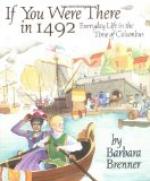Criminals sent to the Indies.
In 1497, two very injudicious edicts were published by the Catholic Sovereigns, upon the advice, as we are told, of Columbus; one, authorizing the judges to transport criminals to the Indies; the other, giving an indulgence to all those who had committed any crime (with certain exceptions, among which heresy, lese majeste, and treason, find a place) to go out at their own expense to Hispaniola, and to serve for a certain time under the orders of the admiral. The remembrance of this advice on his part, might well have shamed Columbus from saying, as he did three years afterwards, in his most emphatic manner, “I swear that numbers of men have gone to the Indies who did not deserve water from God or man.” It is but fair, however, to mention, that Las Casas, speaking of the colonists who went out under these conditions, says, “I have known some of them in these islands, even of those who had lost their ears, whom I always found sufficiently honest men.”
“Repartimientos.”
In 1497, letters patent were issued from the Sovereigns to the admiral, authorizing him to grant repartimientos of the lands in the Indies to the Spaniards. It is noticeable that in this document there is no mention of Indians, so that they had not come to form portion of a repartimiento at this period. The document in question is of a formal character, expressed in the style of legal documents of the present day, by virtue of which the fortunate Spaniard who gets the land is “to have, and to hold, and to possess,” and so forth; and is enabled “to sell and to give, and to present, and to traffic with, and to exchange, and to pledge, and to alienate, and to do with it and in it all that he likes or may think good.”
While the acts of legislation above narrated, which cannot be said to have been favourable to good government in the Indies, were being framed at the Court of Spain, Don Bartholomew Columbus was doing much in his administration of Hispaniola that led to very mischievous results.
Before the admiral left the island, he had discovered some mines to the southward, and had thought of choosing a port in their vicinity, where he might establish a colony. He had spoken about this in his letters to the Government at home. As he entered the Bay of Cadiz on his return, he met some vessels there, which were bound for Hispaniola, and which contained letters from their Highnesses approving of his suggestion. By these ships, therefore, he sent orders to his brother to make this southern settlement; and the “Adelantado” accordingly proceeded southwards, and fixed upon a port at the entrance or the river Ozama. He sent for artizans from Isabella, and commenced building a fortress, which he called St. Domingo, and which afterwards became the chief port of the island.
Xaragua penetrated; tribute imposed upon the Indians.




